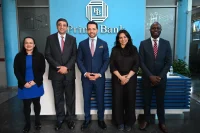quity Bank has been featured in a recent report by International Finance Corporation (IFC) and Bridgespan titled “Private Sector and Refugees: Pathways to Scale.”
The report, which was launched in Amman, Jordan, is the first-of-its-kind study on private sector initiatives with refugees and host communities in Africa & the Middle East. The report features more than 170 private sector initiatives focused on refugees and host communities, including a case study on Equity Bank’s initiatives on extending financial inclusion to refugees.
According to the report, over 68 million people have been forcibly displaced worldwide and become refugees. Of these, 85% are in low- & middle-income countries, with the majority hosted in 10 countries across Africa and the Middle East. However, the report argues that refugees are not just passive aid recipients—they contribute to economic growth in their host countries.
Equity Bank’s Director of Special Projects Allan Waititu said: “Extending services to refugees is part of the Bank’s strategy to deepen financial inclusion and broaden access.”
Equity now provides financial intermediation to thousands of refugees in Kenya’s Dadaab and Kakuma refugee camps; Uganda’s Olunchinga, Impevi & Nakivale refugee camps, and Rwanda’s Gihembe, Kigeme, Kiziba, Mahama, Mugombwa and Nyabiheke refugee camps.
In partnership with UNHCR and World Food Programme, the Bank facilitates cash based assistance by providing refugees with Debit Cards that are linked to bank accounts, in which aid organizations deposit benefits. Once they open accounts with Equity Bank, members of the refugee communities enjoy a wide range of financial services, including personal and group services as well as micro credit facilities.
Equity deepens financial inclusion through programs such as financial education and entrepreneurship skills training. The bank is currently working with IFC to design new savings and microcredit programs.
Said Waititu: “Our vision is to see more refugee families become more self-reliant and productive members of the society, with the ability to contribute to economic development.”
In addition, Equity Bank was also recognised for its work with refugees at a High Level Workshop on Financial Inclusion of Forcibly Displaced Persons at The Hague, Netherlands in 2018.
Read: Top editors quit Chris Kirubi’s radio station
The Bank also won the 2017 RES/CON Humanitarian Resilience Impact Award in New Orleans, USA. It was recognized for its role in capacity building, improving livelihoods and financial innovations that have helped those in remote and harsh terrains, especially the refugee community.













Leave a comment